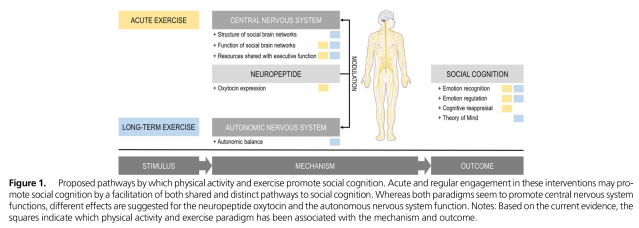Cognition
Going for a Walk Will Help Your Brain With Social Networking
Physical activity can strongly benefit social cognition.
Posted January 7, 2023 Reviewed by Vanessa Lancaster
Key points
- Increasing social complexity applied pressures to brain evolution.
- Our capacities for understanding and responding to social interactions are modulated by oxytocin.
- Oxytocin and cognitive function are improved by physical activity, especially those featuring aerobic endurance.

People are animals, and animals are moving machines. Having a body in motion is important for brain health. This is especially the case for so-called executive functioning, including memory, planning, flexibility, and organization. But a part of humans that has evolved along with our bodies and brains is the social structures and interactions within which we all live.
Social Costs of Cognition
Despite the suggestion that evolutionary pressures from the increasing complexity of social interactions contributed to the emergence of our big brains, how physical activity might impact social cognition has been relatively little explored. Social cognition includes the capacity to recognize emotions derived from seeing and hearing emotional regulation and mirroring by empathizing with others. The capacity for social cognition is related to all our relationships with others, academic achievements, career success, and overall mental health.
In a paper in Exercise and Sport Sciences Reviews, Sebastian Ludyga, Toru Ishihara, and Keita Kamijo suggested an interesting way to view the effects of physical activity, especially endurance work, on social cognition. These folks view social cognition through the lens of evolution. They propose that central and autonomic nervous system functions evolved to allow us to better cope with social systems. Further, this capacity is highly sensitive to endurance activity and aerobic fitness.

Physical Health and Hormones
The neuropeptide oxytocin, formed and released by the pituitary gland, may contribute to social cognition and is quite sensitive to physical activity. As such, when we can achieve and maintain higher levels of aerobic fitness may support increased capacity for abilities in social cognition due to the regulation of autonomic nervous system balance. As an overall takeaway, Ludyga and colleagues proposed that both "acute and long-term physical activity and exercise have the potential to benefit social cognitive abilities, such as emotion recognition and regulation," likely through the mediating effects of oxytocin.
Bodies in Motion Benefit Brains
It's becoming quite clear that a physically active lifestyle is an expectation of all our bodily systems, including brain function. When we acknowledge and embrace our animal nature of moving, conserved by evolution, we best provide the cues needed to survive and thrive. Especially with regard to social cognition, such cues are critical in the increasingly complicated society, one heavily influenced by social media, within which we live. Give your body and brain the best chance to thrive by getting out and about, moving through time and space while you walk, run, bike, and more.
(c) E. Paul Zehr (2023)
References
Ludyga, Sebastian; Ishihara, Toru; Kamijo, Keita. The Nervous System as a Pathway for Exercise to Improve Social Cognition. Exercise and Sport Sciences Reviews 50(4):p 203-212, October 2022. | DOI: 10.1249/JES.0000000000000300


